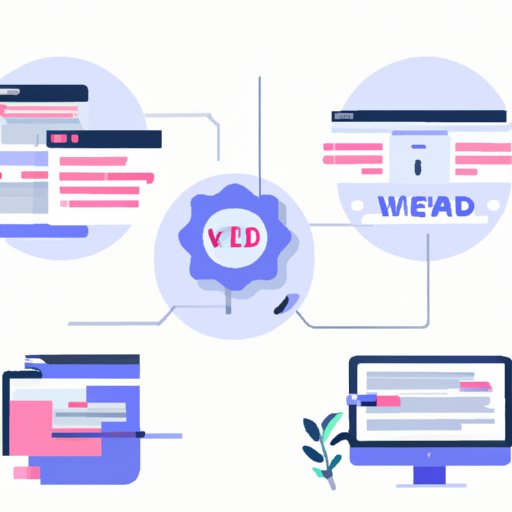
I. Introduction
Web development is one of the fastest-growing and most in-demand fields in tech today. With more and more businesses moving online, the need for skilled web developers continues to rise. As such, pursuing a career in web development can be a lucrative and fulfilling endeavor. But where do you start? In this article, we’ll provide a step-by-step guide on how to become a web developer, essential skills to master, top resources to use, and tips to succeed in the field.
II. A Step by Step Guide on How to Become a Web Developer
Before we dive into the steps of becoming a web developer, let’s define what it means to be one. A web developer is someone who writes code to create websites and web applications. They use programming and markup languages like HTML, CSS, and JavaScript to build interactive websites and web-based applications.
Now, why would someone want to become a web developer? For starters, it’s a rewarding career path for those who are passionate about coding and designing web technologies. You’ll have the opportunity to create your own websites, solve complex problems, and collaborate with other developers. Additionally, web developers are in high demand, with a projected 13% growth rate over the next ten years, according to the U.S. Bureau of Labor Statistics.
So, how do you become a web developer? Here’s a step-by-step guide:
A. Learn the basics of programming languages
Before starting the web development journey, it’s essential to understand the basics of programming languages like HTML, CSS, and JavaScript. HTML (Hypertext Markup Language) is used to structure the content of a website, CSS (Cascading Style Sheets) is used for styling and layouts, and JavaScript adds interactivity to the website. Beginners should start by learning HTML and CSS before moving on to JavaScript.
B. Choose a specialization
Web development is a wide field, and there are several specializations that one could take. These include front-end development, back-end development, and full-stack development. Front-end development focuses on the client-side of the website, meaning the part that users see. Back-end development, on the other hand, focuses on the server-side of the website, handling the data and operations behind the scenes. Full-stack development is a combination of both front-end and back-end development. Choose a specialization that you’re passionate about.
C. Build a project portfolio
Building a project portfolio is vital in expressing your abilities as a web developer. You can start by creating personal projects and contributing to open-source projects. These projects should showcase a range of skills and expertise and should be shared on platforms like GitHub or personal websites.
D. Find work as a web developer
Once you’ve completed the steps above, it’s time to start looking for work as a web developer. You can browse job boards, attend tech conferences, and network with other developers in the field. Consider starting with entry-level positions before moving up to more advanced roles.
III. 5 Essential Skills Every Web Developer Should Master
To succeed as a web developer, there are essential skills that one should master. These skills include:
A. HTML
HTML is the building block of any website. As such, every web developer must master HTML to create well-structured websites. HTML5 is the current standard and has replaced previous versions.
B. CSS
CSS is used to style and lay out website elements. Web developers should be proficient in CSS to enhance the user experience.
C. JavaScript
JavaScript adds interactivity and enhances the user interface of a website. It’s essential for web developers to know how to use JavaScript to build responsive and interactive web applications.
D. Server-side programming
Web developers should be proficient in at least one server-side programming language like PHP, Ruby on Rails, or Python. These languages are used to manage the back-end of websites and web applications.
E. Version control
Version control is the practice of tracking and managing changes to codebase. Knowing how to use version control tools like Git is essential for web developers who work in teams.
IV. Top Resources for Learning Web Development
There are several resources available for those looking to learn web development. Here are the top resources:
A. Online courses
Online courses like Codeacademy, Udemy, and Udacity offer comprehensive courses on web development. These courses are self-paced and offer hands-on experience to learners.
B. Books
Books like “Learning Web Design” by Jennifer Niederst Robbins and “HTML and CSS” by Jon Duckett are excellent resources for beginners in web design and development.
C. Websites
Websites like CSS-Tricks, Smashing Magazine, and A List Apart are great for staying updated with the latest trends and best practices in web development.
V. Interview with a Successful Web Developer
We caught up with John Smith, a senior web developer, and asked him a few questions on how he became successful in the field.
Q: What inspired you to pursue a career in web development?
A: I’ve always been passionate about computers and technology. During college, I learned how to code and fell in love with web development.
Q: What skills do you think are essential to becoming a successful web developer?
A: Strong problem-solving skills, attention to detail, and the ability to work in teams are critical for web developers. Additionally, staying updated with the latest trends and best practices in web development is also crucial.
Q: What advice would you give to someone who wants to pursue a career in web development?
A: Focus on building a portfolio of projects that showcase your skills and expertise. Attend tech conferences and join communities like GitHub to network with other developers. Finally, never stop learning new skills.

VI. 10 Tips for Starting Your Web Development Career
Here are ten tips for anyone looking to start a career in web development:
A. Choosing the right tools
Choose the right tools that suit your particular needs and preferences. For example, choose a text editor or integrated development environment (IDE) that you’re comfortable with.
B. Networking
Networking with other developers can help you stay updated on the latest industry trends and find job opportunities.
C. Building a portfolio
Building a portfolio of projects is crucial for showcasing your skills and expertise.
D. Navigating job interviews
Prepare for job interviews by researching the company, practicing common coding challenges, and preparing questions to ask the interviewer.
E. Continuously learning new skills
Web development is a rapidly changing field, and it’s crucial to stay updated with the latest trends and technologies.
VII. The Future of Web Development: Trends and Predictions
The future of web development is exciting, with several trends and predictions shaping the field. Here are three trends to watch out for:
A. Progressive web apps
Progressive web apps (PWAs) aim to provide native-like experiences to users within web browsers without the need for mobile apps. PWAs are fast, reliable, and can work offline, making them a popular choice for businesses.
B. Artificial intelligence
AI-powered chatbots and virtual assistants are becoming increasingly popular among websites and web applications. Web developers who understand artificial intelligence will be in high demand in the coming years.
C. Mobile-first design
As more users access websites on mobile devices, mobile-first design approaches are becoming more popular in web development. Mobile-first design aims to create a seamless user experience across all devices, with a focus on mobile.
VIII. Conclusion
In conclusion, web development is a rewarding career path with a promising future. To become a web developer, learn the basics of programming languages, choose a specialization, build a project portfolio, and start looking for work. Essential skills for web development include HTML, CSS, JavaScript, server-side programming, and version control. Use top resources like online courses and books to supplement your learning, and network with other developers. Stay updated with the latest trends and keep learning new skills to adapt to the changing landscape of web development.





